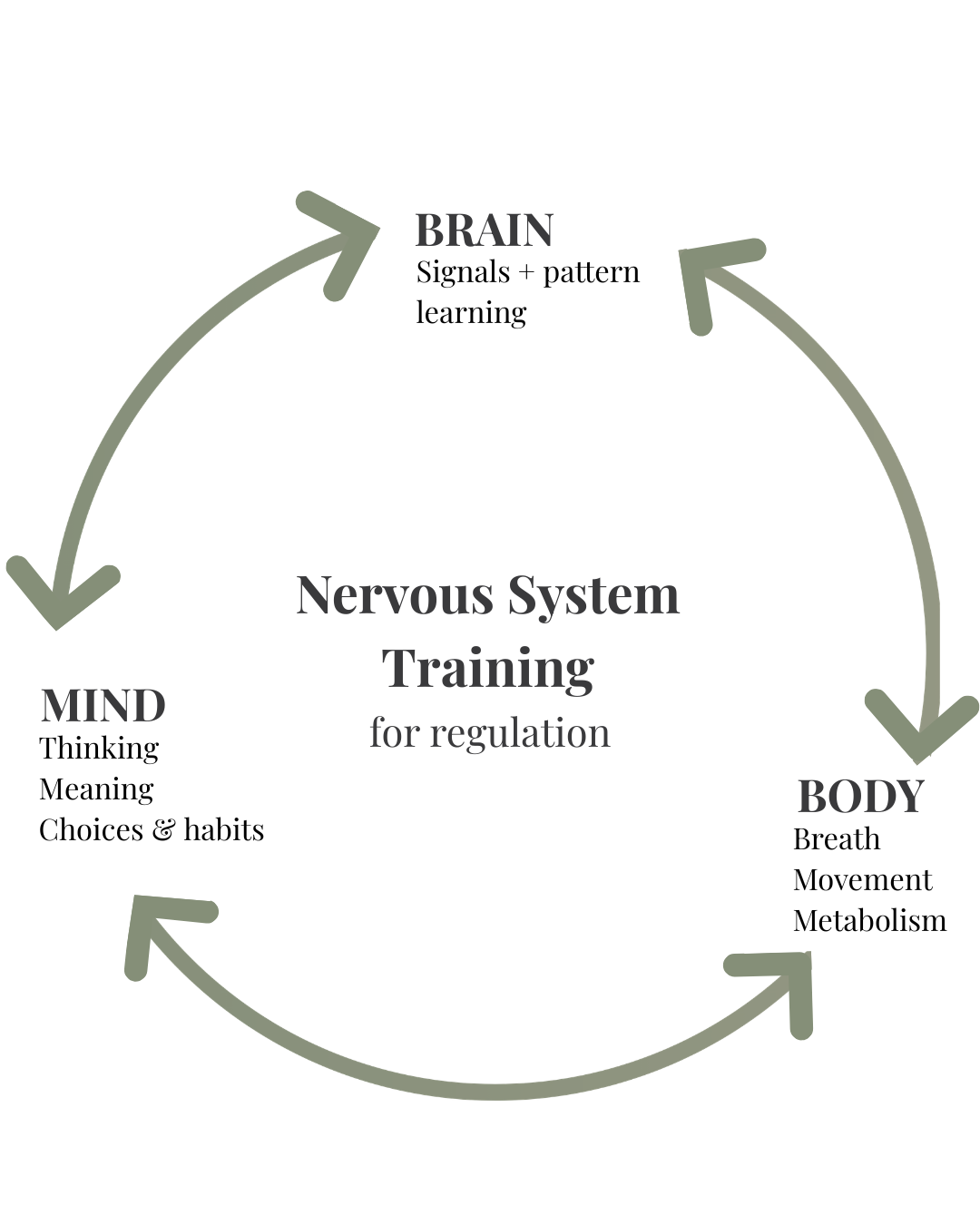
In this post:
What You’ll Learn About Mitochondrial Health and Sustained Energy
-
Why mitochondria are more than “powerhouses” and how they fuel both body and brain for sustained performance.
-
What happens when mitochondria are damaged and why this leads to fatigue, brain fog, and reduced resilience.
-
How mitophagy renews your energy system, with proven strategies to boost mitochondrial health through exercise, fasting, sleep, and oxygen-based therapies.
-
The two-way link between mitochondria and nervous system regulation, and why this matters for stress recovery and adaptability.
-
How mitochondria influence leadership and social performance, shaping confidence, collaboration, and resilience under pressure.
-
Why stress and energy-seeking behaviours are connected, and how better mitochondrial function helps prevent cravings, fatigue, and burnout.
A science-led guide for professionals who want to understand stress differently and turn nervous system insights into a performance advantage.
This post is part of a larger piece about nervous system training for stress and performance.
Click here for: The Complete Guide to Nervous System Training for Stress and Performance
Why Mitochondrial Health Matters for Sustained Energy
Every demand on your mind or body, whether leading a team or powering through a workout, depends on mitochondrial health and sustained energy. That energy is produced inside your cells by mitochondria, microscopic organelles, that transform food and oxygen into ATP (adenosine triphosphate).
More than just energy producers, mitochondria regulate stress responses, hormones, influence mood and cognition, and even shape social behaviours. Mitochondria are the hidden currency of resilience, energy, leadership, and sustained performance.
What Are Mitochondria Anyway?
Mitochondria are tiny structures found inside nearly every cell of the body. Their primary role is to convert the oxygen you breathe and the food you eat into ATP, the energy that powers every biological process. Because of this, organs with the highest energy demands, such as the brain, heart, liver, and muscles, contain the greatest number of mitochondria. A single heart cell, for instance, can house thousands of them.
But mitochondria do far more than generate energy. They also help regulate hormones, inflammation, immune function, and cell communication, while influencing mood, cognition, and stress reactivity. They are essential for our entire metabolic process.
When Mitochondria Are Damaged:
Although mitochondria are highly efficient, they are also vulnerable. Chronic stress, poor nutrition, toxins, inadequate sleep, and ageing can all reduce their function. When this happens, cells fail to meet energy demands, leading to fatigue, brain fog, reduced stress tolerance, and a greater risk of illness.
How to Renew and Improve Mitochondrial Health
The good news is that mitochondria are trainable. The body has a built-in renewal process called mitophagy, which clears out damaged mitochondria and replaces them with healthier, more efficient ones.
Proven Ways to Stimulate Mitophagy and Boost Sustained Energy
-
Regular exercise (especially interval and resistance training)
-
Intermittent fasting or ketogenic nutrition
- Diet: Nutrient-dense and balanced
- Quality sleep and recovery practices
-
Oxygen-based therapies such as IHHT
-
Red-light therapy
Each of these approaches supports mitochondrial turnover, boosting long-term resilience in both mind and body.
Mitophagy and Nervous System Regulation: A Two-Way Street
Mitochondrial renewal through mitophagy doesn’t just restore energy, it strengthens nervous system regulation. The brain relies on a steady flow of ATP to shift smoothly between sympathetic “drive” and parasympathetic “recovery.” When mitochondria are damaged, this switching falters, leaving you stuck in stress mode or slow to recover.
The relationship runs both ways. A well-regulated nervous system supports autophagy and mitophagy, clearing waste, repairing cells, and protecting brain function. In short, healthy mitochondria fuel regulation, and balanced regulation protects energy. For demanding lifestyles, this two-way street is the foundation of resilience, adaptability, and sustained performance.
Stress as an Energetic Process:
How Mitochondria Decide Performance
Reframing stress as an energetic challenge changes how we think about resilience. At the centre are mitochondria, gatekeepers that integrate signals from the nervous, immune, and endocrine systems to decide whether stress fuels growth or drains performance.
-
Adaptive stress: from exercise, learning new skills, or moderate altitude exposure, challenges mitochondria to work more efficiently. This sharpens focus, strengthens resilience, and enhances energy metabolism.
-
Maladaptive stress, such as chronic illness, toxic environments, or ongoing psychological pressure, overloads mitochondria, drains energy reserves, and accelerates cellular ageing.
Resilience, then, is not just about mindset but about cultivating lifestyle habits and recovery strategies that support mitochondrial health. In this way you train your energy levels to meet challenges, sustain performance, and avoid overwhelm.
Mitochondria and Leadership:
The Hidden Drivers of Social Performance
Emerging evidence suggests that mitochondrial function in the brain shapes social behaviour, resilience, and competitiveness.
-
In animal studies, enhancing mitochondrial efficiency improved social deficits caused by stress and boosted dominance in social hierarchies.
-
In humans, mitochondrial dysfunction is linked to conditions affecting adaptability (e.g., ASD, ADHD, depression and anxiety).
-
Energy metabolism in the nucleus accumbens, a brain region tied to motivation and reward, predicts whether stress drives anxiety and withdrawal or fuels confidence and leadership.
Your ability to thrive socially, whether in collaboration, leadership, or competition, depends not just on psychology but on the energy that fuels your cells, brain and body. When mitochondrial function is strong, the brain sustains focus, memory, adaptability, and confidence. When it can’t keep up due to age or dysfunction, stress can overwhelm our capacity to be resilient and keep up the demand of daily life.
Supporting mitochondrial health doesn’t just fuel physical endurance, it underpins how you conduct yourself cognitively and socially under pressure.
Stress, Food, and Energy-Seeking Behaviours
Stress raises cellular energy demand, and mitochondria both supply this energy and also drive eating behaviour. Acute and chronic stress are strongly linked to cravings for high-fat, high-sugar foods. Elevated cortisol levels not only increase appetite but also promote abdominal fat storage and metabolic imbalance. Chronic stress, therefore, drives us towards immediately available sources of energy; this explains our drive towards calorie-dense foods, which are helpful in survival contexts but less optimised for modern performance.
If you’re craving unhealthy foods at work, treat it as a signal that your body is experiencing stress and looking for ways to boost energy and meet demand.
Take it as a chance to stand back and think of alternatives, such as stress and workload management, or taking a break and bringing your nervous system into parasympathetic balance. Consider food sources that sustain energy rather than offer immediate calories.
In Summary: Mitochondrial Health, Sustained Energy, and Performance
Recent research reframes stress as an energetic challenge affecting us physically and cognitively. Every demand, whether physical exertion, intense focus, or social pressure, requires mitochondria to ramp up energy production and meet our bodies’ demands.
Mitochondria don’t just make ATP. They regulate the metabolic signals that determine how effectively you respond and recover. When they keep pace, stress can become a catalyst for stronger resilience but if energy supply falls short, fatigue, inflammation, and diminished cognitive performance can also be the result.
By seeing stress through the lens of energy management, we can see that performance hinges on mitochondrial capacity. Supporting mitochondrial health through physical training, recovery, nutrition, and balanced lifestyle choices is a wise strategy for sustaining endurance, and adaptability in demanding environments.
About BodyMindBrain:
At BodyMindBrain, we help motivated adults with high-demand lives build strength, energy, and resilience by training the body, brain, and mind as one integrated system.

